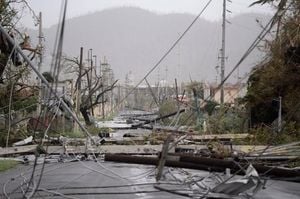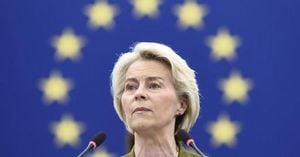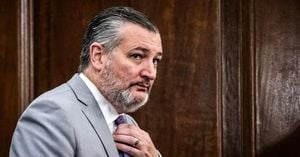On August 15, 2025, the streets of Washington, D.C. looked and felt different. Anyone walking past Union Station or the city’s bustling nightlife hubs couldn’t help but notice the unmistakable presence of uniformed National Guard troops, federal agents, and a flurry of government vehicles. What triggered this dramatic shift in the nation’s capital? A historic—and controversial—federal intervention that has sent shockwaves through city government, residents, and political observers nationwide.
The spark for this extraordinary moment was President Donald Trump’s decision to take direct control over Washington’s police department—a move that city officials immediately challenged as both unprecedented and unlawful. According to the Associated Press, the District of Columbia filed a lawsuit in federal court on August 15, seeking to block Trump’s takeover just hours after his administration escalated its intervention by naming Drug Enforcement Administration (DEA) boss Terry Cole as the new emergency head of the Metropolitan Police Department (MPD).
Police Chief Pamela Smith, who has spent nearly three decades in law enforcement, minced no words in her response. In a court filing, she declared, “In my nearly three decades in law enforcement, I have never seen a single government action that would cause a greater threat to law and order than this dangerous directive.” Smith warned that the move would upend the department’s command structure, sowing confusion and threatening the city’s ability to police itself effectively.
District Attorney General Brian Schwalb, representing the city’s legal interests, echoed Smith’s concerns. He argued that the federal takeover was not only illegal but also poised to “wreak operational havoc” on the MPD. Schwalb’s lawsuit contended that conflicting commands and confusion about who’s in charge would be a serious problem for effective policing. “The administration’s unlawful actions are an affront to the dignity and autonomy of the 700,000 Americans who call D.C. home,” Schwalb stated, as reported by the Associated Press.
The legal and political battle unfolded quickly. Trump’s order rescinded longstanding MPD policies that limited police inquiries into immigration status and required that all new directives receive approval from the DEA’s Cole. U.S. Attorney General Pam Bondi, appointed by Trump, said Thursday night that the new arrangement would end so-called “sanctuary policies” and allow federal priorities to take precedence in the city’s policing. Bondi’s directive came shortly after Chief Smith had instructed MPD officers to share information with immigration agencies regarding people not in custody—a move that Bondi said did not go far enough to satisfy federal demands.
Washington Mayor Muriel Bowser, a Democrat, was unequivocal in her opposition. She wrote on social media, “There is no statute that conveys the District’s personnel authority to a federal official.” Bowser’s stance reflects a broader, longstanding tension over the unique status of Washington, D.C. While the president holds more power over the capital than any other U.S. city, the Home Rule Act of 1973 granted D.C. the right to elect its own mayor and city council. Trump is the first president since that law’s passage to exert direct control over the city’s police force—a power that, by statute, is limited to 30 days without congressional approval. Trump, however, has suggested he may seek to extend that authority.
As the legal wrangling played out in courtrooms and city hall, the physical reality on D.C.’s streets became impossible to ignore. According to CNN, more than 1,750 federal law enforcement personnel fanned out across the city, including agents from the FBI, ATF, DEA, Park Police, U.S. Marshals Service, Secret Service, and the Department of Homeland Security. National Guard troops, including 300-400 from West Virginia, were deployed at the request of the Trump administration. West Virginia Governor Patrick Morrisey stated in a social media post, “We are deploying 300-400 skilled personnel to the nation’s capital, reflecting our commitment to a strong and secure America.”
These deployments are federally funded and, according to the governor’s office, include the provision of “mission-essential” equipment and training. The National Guard’s role, as described by a White House official, is to “protect federal assets, create a safe environment for law enforcement officials to carry out their duties when required, and provide a visible presence to deter crime.” While the National Guard is not making arrests at this time, officials confirmed that troops may be armed for self-defense purposes if necessary.
The surge in federal forces was accompanied by a series of high-profile actions across the city. The Associated Press reported that twenty federal law enforcement teams made 33 arrests in a single night, including 15 migrants who did not have permanent legal status. Others were picked up on warrants for murder, rape, and driving under the influence. Meanwhile, federal agents and National Guard troops took up positions at major landmarks, transportation hubs, and popular nightlife districts. Department of Homeland Security officers were seen outside Nationals Park during a baseball game, while DEA agents patrolled The Wharf, a favorite spot for locals and tourists alike.
One especially contentious aspect of the intervention has been the removal of homeless encampments. The White House confirmed that 25 such encampments were cleared on Friday alone, with officials stating that homeless individuals would be sent to shelters—or to jail if they refused to leave. Advocates for the homeless have sharply criticized these sweeps, arguing that they disrupt existing efforts to move people into permanent housing and may ultimately prove counterproductive and costly.
The reaction from city officials and residents has been intense. D.C. Councilmember Robert White told CNN that he was “startled like most district residents and many Americans. President Trump is breaching democratic norms,” he said, noting that Trump has discussed making similar moves in other cities. The deployment of National Guard troops from outside the city marks a new escalation, one that some see as a dangerous precedent for federal intervention in local affairs.
Yet, the Trump administration and its supporters argue that the intervention is necessary to combat crime and restore order. At the White House, Trump declared that he had “surged 500 federal agents into the district,” emphasizing the need for a strong law enforcement response. West Virginia Adjutant General Jim Seward, who commands the state’s troops, said, “The National Guard’s unique capabilities and preparedness make it an invaluable partner in this important undertaking.”
For many Washingtonians, the presence of so many federal agents and troops is deeply unsettling. The city, which has grappled with spikes in violence and visible homelessness, nevertheless has a homicide rate lower than several other major U.S. cities. Critics argue that the Trump administration has exaggerated the severity of D.C.’s public safety challenges to justify its sweeping assertion of federal authority.
As the legal and political battles continue, the city remains on edge. The outcome of D.C.’s lawsuit and the broader implications for federal-local relations are far from clear. What is certain is that the events of August 2025 have set a new—and contentious—precedent for presidential intervention in the capital’s affairs. Residents, officials, and the nation are watching closely as the story unfolds, each side convinced that the stakes for democracy, public safety, and local autonomy could not be higher.




